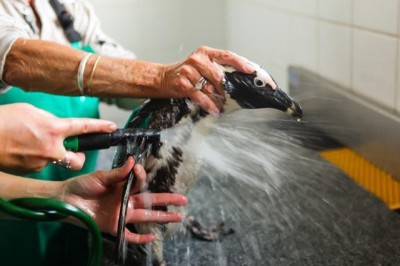1st group of rehabilitated penguins to be released after mystery oil spill
The Southern African Foundation for the Conservation of Coastal Birds (SANCCOB) is releasing the first group of African penguins admitted to its centre in Cape St. Francis following a recent mystery oil spill in Algoa Bay (Port Elizabeth).

Thirty oiled African penguins and four orphaned African penguin chicks were admitted from Bird and St. Croix islands over the past three weeks, after being rescued by rangers from the Marine Section of the Addo Elephant National Park (SANParks). The first seven penguins will be heading back into the wild on 20 June at Seal Point Lighthouse (Cape St. Francis) after being succesffully rehabilitated and approved for release by SANCCOB’s veterinary team.
Members of the public are invited to join SANCCOB in waving ‘bon voyage’ to the seven rehabilitated penguins on Saturday, 20 June, at 10h00 at Seal Point Lighthouse in Cape St. Francis. Louanne Mostert (Development and Marketing Coordinator) said, “Seven lucky penguin fans will have the opportunity to ‘adopt’ one of the rehabilitated penguins for R500 and play a role in the future of the species – prospective penguin parents should be at SANCCOB’s seabird centre situated next to the Lighthouse from 09h00 on Saturday.”
Four of the birds being released were rescued from St. Croix Island (just off-shore Coega Harbour) and three were originally from Bird Island – two islands that collectively support approximately 60% of South Africa’s endangered African penguin population. Thanks to the staff and volunteers at SANCCOB, each of the birds ready for release now have a healthy minimum weight of 2,8 kilograms and have regained the natural waterproofing of their feathers needed to survive in the ocean.


“The penguins are strong and have regained their natural waterproofing within an impressive period of two and half weeks after the sticky oil was washed off their feathers. Releasing the first group of birds will be a wonderful reward for everyone who helped to rescue and rehabilitate them”, said Juanita Raath (Rehabilitation Coordinator).
A team of 15 SANCCOB staff and local volunteers have been working tirelessly for more than four weeks to wash, hydrate and feed the 30 oiled seabirds and care for four penguins chicks that were admitted as a result of their parents being oiled. The last two oiled penguins were washed over the weekend and now both weigh more than 2,5 kilograms. The four orphaned African penguin chicks now all weigh more than 1,5 kilograms and are able to eat a whole fish – signs that they are responding well to the special care by the rehabilitation staff. SANCCOB will continue to care for the remaining washed birds for the next two to three weeks, while the chicks will have to receive at least another month of T.L.C before they will be ready for release back into the wild.
However, washing and cleaning the birds is only a small part of the rehabilitation process, as many hours were spent building enclosures, cleaning syringes, preparing fish and making fish formula for the weak birds. “The local volunteers have been a great help to the SANCCOB rehabilitation team over the past month and the support we have received from the local community throughout this seabird rescue operation is highly valued. All of these activities have contributed to yet another success story for SANCCOB Eastern Cape,” said Louanne Mostert.

As a non-profit organisation, SANCCOB is asking the public to donate towards the rehabilitation and hand-rearing costs of the remaining 27 endangered African penguins and to help ensure they are also successfully released back into the wild in the coming weeks. Donations may be made online by visiting www.sanccob.co.za or through an electronic funds transfer to:
SANCCOB
First National Bank
Account #: 59 23 713 5859
Branch: 203809
Account type: Current
Swift code: FIRNZAJJ461
Reference: Initials, surname & OIL
For further information, please contact SANCCOB Eastern Cape on 042 298 0160, 082 890 0207 or 
Call us and schedule your listing today! Contact Us
Copyright © 2025 Hermanus Online Magazine. Web Development by Jaydee media.

